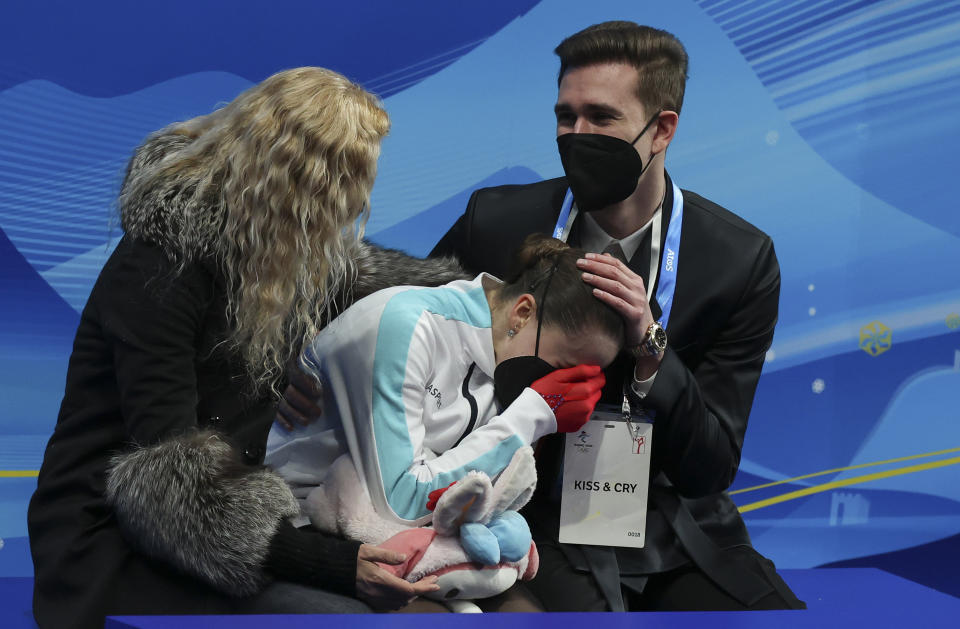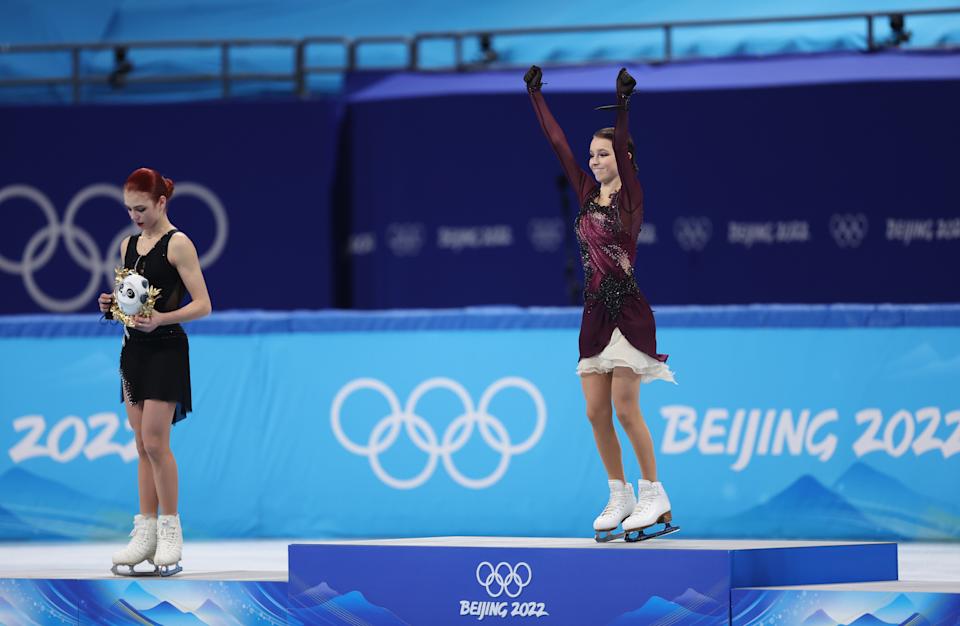BEIJING — The gold medalist sat alone clutching a stuffed bear, her eyes distant and unfocused. The silver medalist appeared lost, her mascara streaked, uncertain what to do next. The fourth-place finisher — the one who was supposed to win gold, the one who had borne the world’s contempt on her 15-year-old shoulders — was nearly inconsolable, surrounded by coaches and attendants.
Women’s Olympic skating hit a new low Thursday night, a cold tragedy of abuse and pain played out over the course of 3 1/2 hours. When it was over, Russians dominated the podium, skaters reached new heights of grace and athleticism, a ceremony bestowed medals on deserving winners … and almost everyone looked as miserable as if they were at a loved one’s funeral.
Kamila Valieva, Anna Shcherbakova and Alexandra Trusova — dubbed “the Quad Squad” in more innocent days — came into these Olympics carrying the expectations of a nation while skating under the skeptical eyes of the world. When long-delayed test results indicated Valieva, the most talented of the three, had skated with a banned medication in her system late last year, skepticism turned to withering criticism.
Valieva — who, again, is 15 years old — became the face of Russian deception. The Russians have worked over the IOC for the last eight years, their sophisticated state-run doping scheme in Sochi going virtually unpunished … unless wearing a different uniform and not hearing the Russian anthem while still collecting armloads of medals qualifies as “punishment.”
The IOC never stepped up and did what it should have done to Russia — booted not just their name, but their entire delegation, from the Games for four or six or eight years — and so when Valieva’s positive test showed up, the world’s entirely justified rage at last had a target.
Valieva couldn’t handle the pressure. Who could? What 15-year-old, raised to believe the words of her coaches were gospel, raised with Olympic gold as the only barometer of her worth as a human being, could handle that level of worldwide scorn?


It’s possible — in fact, it’s pretty much obligatory, if you have a soul — to loathe what the Russians have done in the Olympic Games and yet feel sympathy for Valieva. It’s possible to love the sinner and hate the sin — to be disgusted with corrupt sports yet regret that the heartless pursuit of Olympic gold shattered the life of a young girl.
Out on the ice, Trusova and Scherbakova skated the routines of their lives. Trusova’s aggressive, five-quad performance was a masterpiece of daring and aggression. Scherbakova’s more graceful routine was the Monet to Trusova’s Van Gogh, sentimentality rather than fiery passion. Both performances were magnificent, and both laid the groundwork for Valieva.
She planned to skate an incredibly ambitious program: three quads, seven triples. She would skate to Ravel’s “Bolero,” a familiar composition she’d used during her climb to skating’s peak. She warmed up while Scherbakova waited for her scores to come in, and then — just a few seconds past 9:51 in the evening, local time — she began.
“Bolero” is a stately march, a ballet composed in the early 20th century for a Russian dancer. It begins slowly, with a repetitive, martial beat played on a snare drum. Woodwinds wrap around the beat, and Valieva began her routine moving as sinuously as the oboes and horns that trade the march’s melody back and forth.
But where “Bolero” marches on relentlessly, Valieva stumbled. Her quads and triples didn’t land. Her balance skewed. Her spins wavered. She cracked, and then she broke.
Television can’t capture how truly, deeply alone skaters are out on the ice. They skate out prior to their routine on an empty rink. They skate, alone, across the vast whiteness of the ice. They end their program standing alone before the world as distant judges coldly dissect every millimeter of their performance.
On this night, though, television perfectly captured the casual cruelty that underlies so much of skating. Millions watched Valieva, tears on her face, her entire life’s work in shards, skate to the edge of the rink … and watched as her black-clad coach, Eteri Tutberidze, immediately critiqued her performance without offering even offer the most basic shreds of empathy or affection. They watched Valieva sob as she waited on the critical judgment of her performance, even as she already knew she’d fallen so far short of everyone’s expectations.
Television can also show just how young these skaters are. As magnificent as they were on the ice, the Russian skaters looked completely adrift and bereft off it. Valieva’s voice hitched as she openly wept, clutching a small stuffed animal. After she learned her fate, she buried her face in her hands and sobbed deeply. Trusova, her mascara smeared, initially refused to go to the podium. Shcherbakova, the gold medalist, sat alone, holding her bear, staring off beyond the camera.


Valieva’s score sucked the air out of the arena, and fans — including the rowdy Russian contingent — quickly filed out, as if driving past an accident. Out at the far end of the rink, crews unrolled a blue carpet and walked in the podium. There was no reason to delay the ceremony anymore. No medal for Valieva meant medals for everyone else.
Valieva left the rink and walked under the stands to the faint cheers of a few Russian fans. She walked through the mixed zone without speaking, and disappeared deep into the arena. She has a story to tell, but when she’ll tell it — when she’ll be allowed to tell it — is a mystery for now.
This whole sordid, sorry saga should force the IOC and skating to take a hard look at every element of this sport, from the ages of competitors to the behavior of coaches. But it won’t. Tomorrow, too many coaches will show tonight’s routines to the next generation of skaters — skaters who may not have even reached double digits in age — and they’ll point out Valieva’s flaws rather than her strength. They’ll establish the quad — never performed by a woman in the Olympics before this week — as a bare minimum rather than a career highlight. They’ll keep alive a system in which even an Olympic medal doesn’t bring true joy.
“I’m very glad that I did perform the five quadruple jumps, and it took me a long time to achieve this. I’m more than happy today with my performance,” silver medalist Trusova said, in a voice that sounded less like she was happy and more like she was mourning the death of a beloved pet.
“I’m just overwhelmed by happiness on one hand,” Shcherbakova said, just minutes after winning a gold medal. “On the other hand, I feel this emptiness inside somehow.”
Amid all the somber, sad air, only one person seemed truly joyful: bronze medalist Kaori Sakamoto. She skated around the arena holding a Japanese flag over her head, her smile broad enough to almost reach over her mask.
It was the one bright moment in a very dark day for skating.
